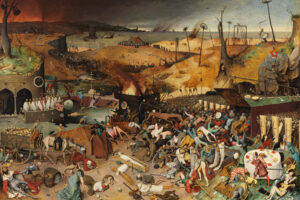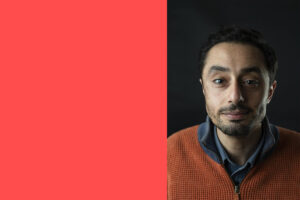
May 13, 2024
“Looking for Palestine in Santiago, Chile” & other work
I was first introduced to Sarona Abuaker’s work in the context of coediting a global anthology of Palestinian poetry for Haymarket Books with Noor Hindi. Toward the beginning of our process, we reached out to fellow Palestinian poets, editors, culture workers, and organizers to nominate folks whom we should solicit for the open submission call. Among the nominations was Sarona Abuaker, and ever since reading her book Why so few women in the street at night, I fell instantly in love with these poems—how they take up space on the page like a kind of dance, how they experiment with form, image, and language at several scales. Abuaker is one of the great rising experimental poets in our Palestinian global diasporic community.
Sitting with these works and reflecting on my editorial work these past few years, I cannot help but think of the innately fragmented nature of our global exilic condition. Through a formally fragmented poetics, however, Abuaker manages to find a balm: weaving together Palestinian conversations from the US to the UK, from the homeland to Chile, in the depths of one of our most catastrophic moments in history.
—George Abraham, Mizna executive editor
Translation is exile.
I have nothing left to say
but I’ll say it.
—Sarona Abuaker
Poem as Photon Returning to Audience
Written with thanks to Basma Alsharif, Fady Joudah, and George Abraham
You have to learn
how to say it
;
if they hear you ask in Arabic—there is a bathroom, they won’t let you in.
[…]
The film whirs and then it pauses.
The ground on which we walk grinds
to silence a continuous presence;
I sink into the sofa, the radio turns the ceiling
in on itself & I ask it: how many years does it take?
I disappear with you into the screen.
I could list all the years but there was an explosion.
Your brains were on the ground
they pool by penthouses
pulled apart to emptiness like a land that makes an orifice.
I dig in the blood to find something to hold.
[…]
The puppet comes out of the ground.
It is made of a sock and it eats itself.
I throw it to the sea.
There is not much sky left
that isn’t covered by the white jellyfish.
I touch your hand and it becomes your head.
The sea is afraid of the ground.
The sky is coming out of our chests.
The buildings talk to each other: destitution.
[…]
Didn’t you know pointing at things is rude?
You point to the end where there is nothing to look at.
You point to the place where the poem does not begin.
The photons we registered as light come from dead stars
and now they come through the slow nitrate gauze.
I am now a snake eating myself
under the scope of the rifle
or the force of love that extends me to you.
I would like to defy death and stop preying on my own tail.
[…]
I managed to stop and went to the library to find a history
of my family, of their village, I open a book like a bibliomancer:
eyes closed until the page’s imperative: TAREEKHTKOM
Translation is exile.
I have nothing left to say
but I’ll say it.
Here is what I saw:
- 1. A car speeds back into the landscape
- 2. A sim character runs over rooftops in Gaza
- 3. A woman walks backward into her room pushing the spectator into the street
- 4. The Mediterranean curls back into itself, afraid of the shore
- 5. A drone watches from the skies as your finger points [again] to loss
I heard everything.
Iron drops from my nose into my throat and I hold my mother’s hand to see a man holding a hand hanging from a piece of steel. I sit in my living room watching your films with my heart racing as I hallucinate the sound of an F-16. I think of my family and how they cannot move. I think of the world on fire. The white jellyfish, the limbless, the woman screaming “baba baba.”
[…]
George Abraham writes:
“When our cities unbecome: when our homes just —& you don’t”
[…]
The flags suffocate us.
In this glittering nightmare I find your palms
and trace the recycled histories as the wave approaches.
There is no redemption in a world created for starvation.
They’ve built this mass grave in a school playground.
Reach for me, won’t you? I’ll be here waiting.
[…]
A kaleidoscope of gray in the landscape of binaries.
The ribbed caged caves in milky smithereens.
Who are we without color?
The phantasmagorical light breathes a life
we are not capable of understanding.
Hand rests on the galaxy entrance.
The doors were open.
They are now closing on these glacial disintegrations.
Warmth to nude marble softens;
do we exist only for your reflection?
When you look away from the mirror
we don’t disappear bending to earth.
A thick calf draws children across the sky.
This loosened strap falls on its own accord.
A spectacle is what you want the world to be
taken by horror when the hands you thought
should stay in the frame, grasp your throat.
[…]
The circularity of this violence: the mind moves one way the body follows: in the recognition of how your mother’s hair sits in a body bag. Arrives. A complete uncoupling.
How many times can a lesson need to be learned?
Humanity is lost when it bears witness.
It’s easier to swallow our own tails, to worship faceless bags.
The people who want to kill us make toast.
They eat breakfast, iron trousers, take their children to school, go to the markets, have
favorite colors, lie on our beaches like bronze statues.
Ozymandias with sunburn.
Our biggest mistake is to think they are so different from us in how the air touches
their skin, the breath of night leaving their throats as they scream with abandon. A
caricature that can kill without sound.
[…]
To lie in bed and watch the world
torched knowing the conflagration
will swallow you whole every day
scenes meant to bring on relaxation
indicate fleeing a candle for electricity
cut an ocean to be pushed into a home
to be demolished a sunset to be missiled
This grief curdles. It’s easier to stay
curled up in this hole. If it collapses at
least I know I’ve chosen to feel my edges
pushed into the walls. The long road winds
off into slopes. The red bird harks at the skies.
Fady Joudah’s [. . .] (Milkweed, 2024) and George Abraham’s Birthright (Minneapolis: Button Poetry, 2020) are referenced in this poem.
Looking for Palestine in Santiago, Chile (August, 2023)
“. . . to summarise what is the relationship of memory to what pleases? This is the story of how I changed my structure”
—Bhanu Kapil, Incubation: A Space for Monsters
I hover over the front cliff. The moon is an ornament that hangs over the scalp of the mountains or the banister. This world is crumbling. The air is thick. It glows bright pink when the earth turns away from the sun. There is death lying low even at the brightest of lights. The city sits in the bowl ready to be eaten, people teeming at all hours of day and night making sound because the silence would be too much to bear. A man plays a violin to a duck. A man dressed with scissors for hands dances in front of cars trimming fake plants. A dog lies down with a mound of popcorn underneath its face. The bowl is hot and heavy with a stench that hangs low. It sits on the curvature as you go up the mountains, the air clears and all the people below lay bare but you can still hear the sirens, voices calling, the birds chirping, the ground breaking underneath the weight of all the unspoken, of all the people who were snatched into air. The city cannot stop moving because in its momentum it sustains itself. The bowl keeps turning even if its insides die. It’s in the stillness you can hear their cries pushing through the asphalt and concrete. It breaks through the cracks and sounds at first like the wind howling in the distance. It’s ignored most of the time. The days pass and the city continues breaking its own feet to stay up, but sometimes when a newcomer arrives, they are seen to be bent low to the ground pushing their ear into the asphalt as their hands lie flat to push themselves into the material. They stay there for a minute or hour or day just to listen and discern what the voices are telling them. On days when the sun is out, their ears become seared to the ground and they become stuck, unable to move, forming a new layer of skin. Their ears suction to the concrete now pumped with the voices of the disappeared and they flail and scream about as their ear is welded to the ground. After a day, they tend to give up and lay their whole face down into the ground and it too becomes welded, taking on scales of a lizard as the sun bakes their face from the top and the ground bakes their face from the bottom. And soon the front side of their body becomes scaled and red from the heat and asphalt. People in the bowl continue the noise and accommodate the new features by moving around them, so from above, the crowd opens a space in the shape of a tear duct or eye to not stamp on the new ground and slowly they begin to melt. Their flesh, hot for a number of months, loses its strength and solidness as the bowl contains the noise pollution and sun. The skin becomes wax-like and soon starts making a hissing sound. By this point, the person’s mind is still functioning but they are no longer able to move. Their eyes roll around their head attempting to tell the people in the bowl what they can hear from below, but soon they are no longer able to use their sockets as the flesh bubbles underneath the weight of the sky, and it spreads across the pavement. Their skin loses its ability to hold itself together. After many months, this is when they begin to sink. And so the crows begin crawling. Tree branches grow thick around their claws as they mold to the image of the sky, opening their beaks—piercing sounds shred the day. Eyes without color blink and judge as shades draw shut. The machine keeps pumping and gassing its way throughout the streets, carrying inside its tin a cart full of burgundy teeth. The city will eat them alive in time, but first it has to make a show of itself. Creatures of habit, they sniff out what feels familiar, the way days round out and cup each action in the expected execution of utterance and touch. The ground shakes beneath their feet but it is the scent of candles and taste of green that punctuate the cracks with the curve of holding. The concrete cracks from under the city and the people crawl. The sun inside the earth switches and begins to rotate counterclockwise. Ninety valves release from the organ a long steam of hiss. A signal that no ground is too high to not be reached. Empty craniums squat in fur. They are new here in the way of flesh. They come to eat the dirt, for the steel is not enough. It tastes of memory. The carcasses whisper. They finger their mouths to dig out any loose shrapnel and continue to eat until their throats clog with soil worms and branches. They scratch miles to search for something that the people who live there do not know exists. Perhaps it was once alive. For now, the city barely breathes. A drop in the valleys is not far enough for the plummet in their chests as they heave the earth out of their mouths and gasp for air as it comes out of their nostrils and eyes. The search continues. They feel the shift in the sun’s belly. Its iron dome ripples. The suit opens its jaws wide to welcome the trenches of hell that reside in each person, luring them to push anyone into its gaping mouth. The youngest was a thirteen-year-old boy who was captured in the night, reported by his neighbor who wished that he would play his music and read stories more softly to his siblings. The tree’s fiber snaps and disintegrates as all life turns in on itself. Butterflies stay in bushes. Dogs stop begging for food. The wind ceases. The only sounds to hear for the coming years are the pops of corked champagne bottles in celebration of the new dawn, erupting screams and cries from those who would disappear. They put a threadbare sheet over my head and asked us to walk to a stadium. We had to choose between electricity and food, and you can’t eat electricity.
Header photo taken by Sarona Abuaker and used with her permission.

Sarona Abuaker has been published in Berfrois, MAP Magazine, the 87press’ Digital Poetics series, KOHL, Ludd Gang, Senna Hoy, and other platforms. Her debut poetry collection, Why so few women on the street at night, published by the 87Press, is a queer phenomenology of collective Palestinian futurisms and memory building. She codeveloped with Dr. Danah Abdulla Countless Palestinian Futures, a game that aims to stimulate the imagination by helping people develop tangible outcomes and ideas around Palestinian futures.

Toward a Free Palestine: Resources to Learn About and Act for Palestine
We are proud to present this text as part of a list of resources to take action for and learn about Palestine, as well as works by Palestinian artists, writers, activists, and cultural workers.












